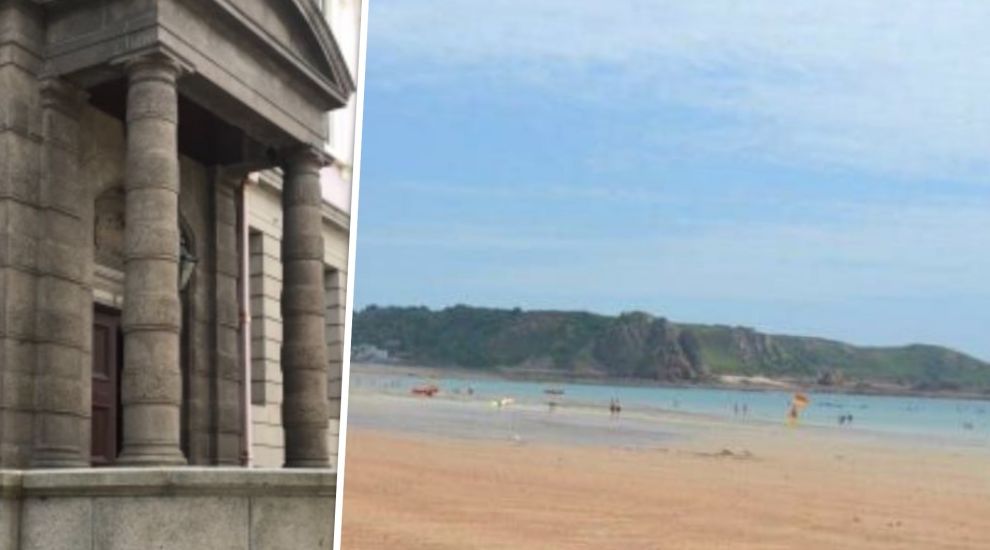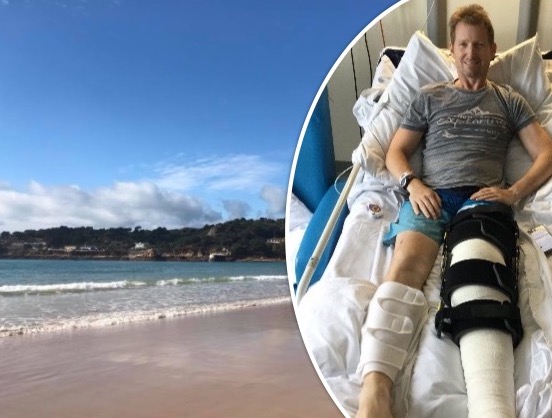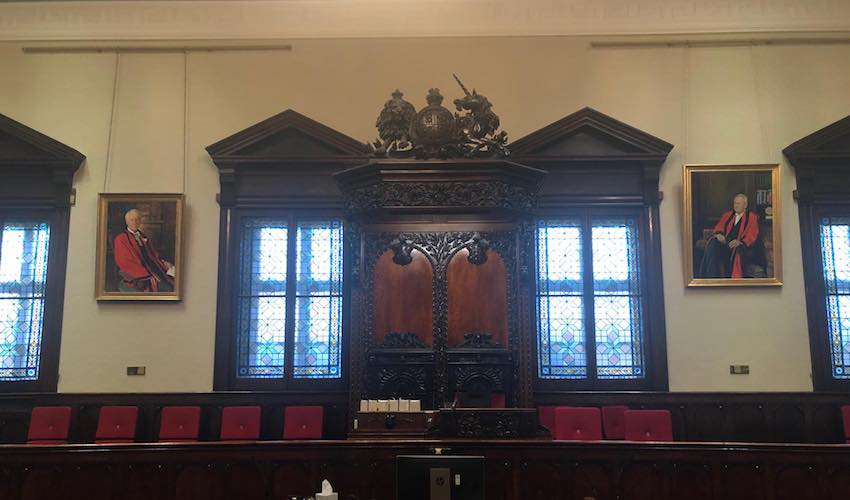


The driver of a jet-ski has said he will remember the crash that nearly severed his passenger’s leg “for the rest of my life” as he tearfully maintained he wasn’t at fault in the Royal Court yesterday.
The civil case brought by Giles Corbin against jet-ski driver Tyson Flath and Michael Dorynek, who was at the wheel of the speedboat that crashed into them four years ago, opened on Monday.
Mr Dorynek has already faced criminal proceedings over the 2017 crash in St. Brelade’s Bay, whereas Mr Flath hasn’t – but Mr Corbin argues they are both responsible.
The first day of the case saw each lawyer outline their client's position to the court, while Tuesday saw Mr Corbin give a tearful account of the day he received the injury at sea which could have cost him his leg.
During cross-examination that started on Tuesday afternoon and continued yesterday, Mr Dorynek admitted he knew his boat was overloaded on the day of the incident but said all passengers were “lightweight” and had somewhere to sit.
He denied knowing some of the equipment on the boat had expired and said he had only found out what the 'kill cord' was after the accident. It transpired after the collision that the emergency safety device was disabled.

Pictured: Mr Corbin's leg injury could have resulted in amputation.
Advocate Simon Franckel, appearing for jet-ski driver Mr Flath, pointed out discrepancies between Mr Dorynek’s evidence in court and his previous statements, which Mr Dorynek justified by the fact he didn’t have a translator on the day they had been produced.
When asked why he hadn’t told the police about the zig-zag driving he had done in the bay, Mr Dorynek said: “I was very nervous, I was very stressed, I was in shock.”
He said the first time he had seen the jet-ski, it was still close to the beach and “somewhere behind him”.
“I wasn’t worried about a collision, we were the only two vessels in the area and there was plenty of space to move around,” he went on to say. “I didn’t consider we were in any danger at the time.”
He said that as he started turning right, the angle “must have prevented” him from seeing the jet-ski and that it must have been moving “very fast”.

Pictured: Advocate David Benest is representing Mr Corbin.
Mr Dorynek said he had realised a couple of seconds before the collision that the jet-ski was not going to stop or change its direction and started waving and trying to shout at the driver. Advocate Franckel, however, suggested this was untrue as neither of the jet-ski passengers reported having seen or heard him, but Mr Dorynek maintained he had done so.
Advocate Franckel suggested Mr Dorynek was “saying what will help his case and not the truth”, which he denied.
Following the incident, Mr Dorynek said his priority was to look after his passengers and that he was planning on coming back to the scene after offloading them. When Advocate Franckel suggested he was “eager to get away” because he knew he had caused the collision, he denied this, arguing that he knew he wasn’t at fault because the jet-ski was overtaking him.
Mr Flath then gave evidence.
He said the speedboat had been in his “blind spot” and that he had become aware of it when he heard a scream and turned his head, seeing the boat coming straight at him.
“If I had seen the boat earlier, I would have focused on what to do,” he said. “My only initial reaction was to move as fast as possible.”
Breaking down in tears, he said he would remember the collision “for the rest of my life” and described how he initially thought Mr Corbin’s leg was “completely severed”.

Pictured: The civil claim is being heard in the Royal Court.
Advocate David Benest - appearing for Mr Corbin - suggested that Mr Flath had seen the boat before the collision, relying on his description of the incident to a 999 operator and his discussion with a police officer shortly after the accident.
In those, Mr Flath had said the boat had been parallel to his jet-ski and then decided to turn.
Mr Flath explained that at the time he was not able to think clearly as he had just been involved in a collision and was trying to make sure Mr Corbin was brought back to shore safely, but Advocate Benest suggested he was in fact “telling the truth… without the distraction of putting a story together”, which Mr Flath denied.
He denied having “ignored the risk of collision”, saying he was not a suicidal person and would have not proceeded if he had become aware of any risk to him or Mr Corbin. He maintained he had been keeping a proper lookout.
“I could only see what I could see at the time,” he said, adding later on: “It wasn’t there to be seen for me.”
He denied attempting to overtake the boat, saying he couldn’t overtake something he hadn’t seen.
Mr Flath rejected Advocate Benest’s view that his entire case had been “fabricated”. He also rejected the suggestion he had “embellished” the truth by saying he had been thrown off the jet-ski to make it appear that the boat’s impact had been greater.
This morning, Mr Flath continued to give evidence, answering questions from Advocate Christina Hall, who is representing Mr Dorynek. She questioned why he hadn't mentioned the speed limit in the bay when he spoke to the police but included it in his statement a few months later, suggesting it was knowledge he had acquired after the incident but Mr Flath disagreed.
He admitted he could have been driving the jet ski at a higher or lesser speed than 17 knots but that "in his experience" he was doing 17 knots.
Advocate Hall suggested Mr Flath hadn't turned but rather continued on a straight line across the bay, arguing that he hadn't mentioned the turn to the police or in his statement. Mr Flath maintained he had changed his course but that the change might have been "minimal", "hence why Giles didn’t notice it" he added.
He couldn't confirm at what angle the boat had come towards the jet ski or what speed it was going just before the collision saying it had only been "a short time".
He said there was no way the accident would have happened if he had been behind the boat.
The case continues before Royal Court Commissioner Sir Michael Birt, sitting with Jurats Jane Ronge and David Hughes, with experts for each party appearing before Court.
Comments
Comments on this story express the views of the commentator only, not Bailiwick Publishing. We are unable to guarantee the accuracy of any of those comments.